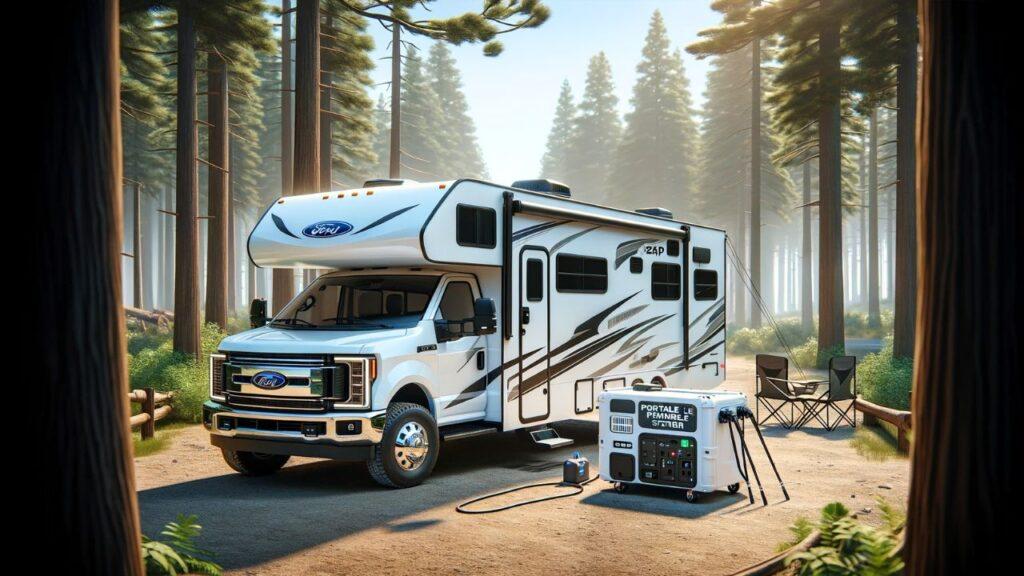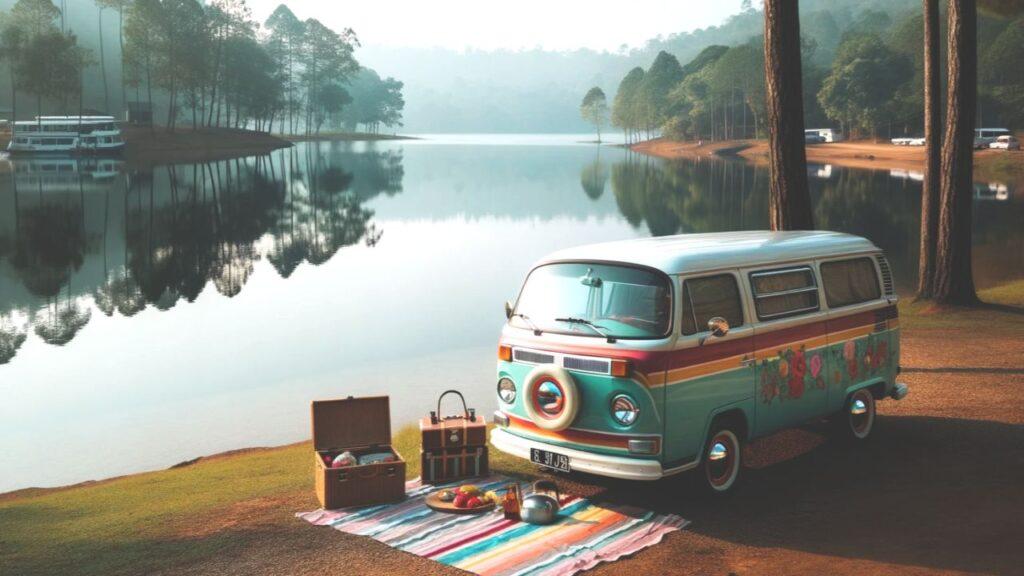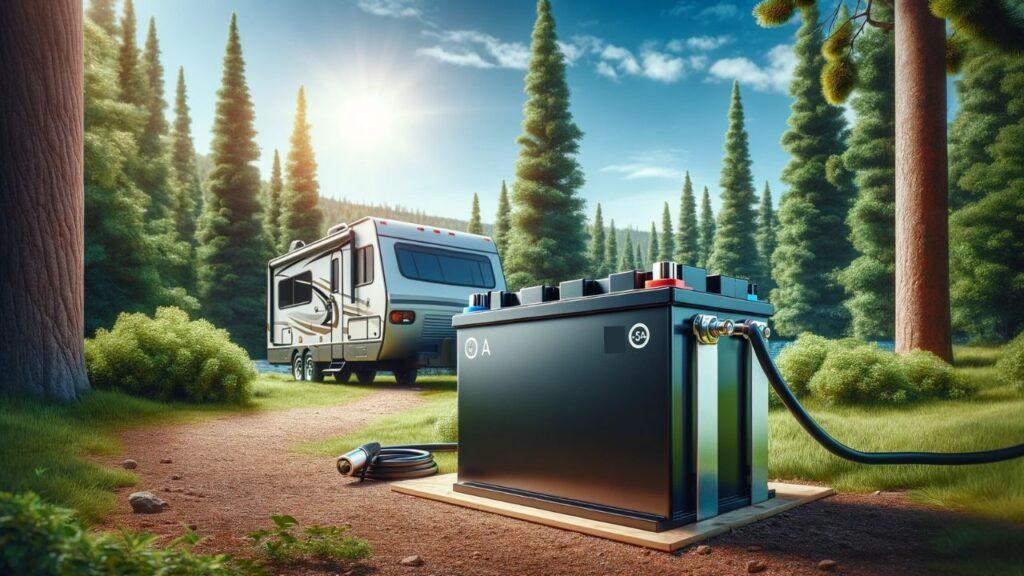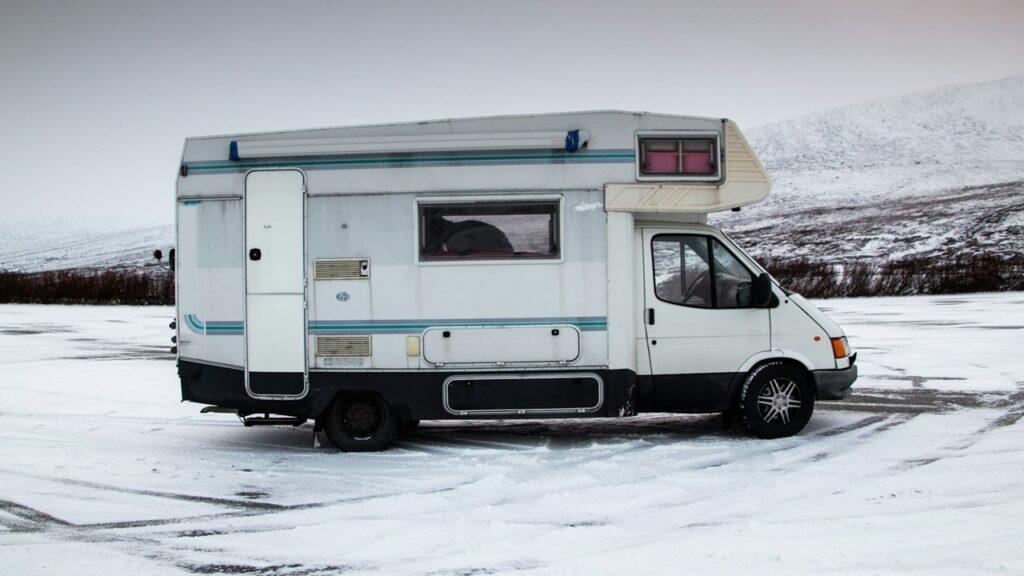Winter camping isn’t fun when your water line turns into an ice block. The right heated RV water hose keeps the water flowing, whether you’re parked at a winter RV park or deep in the mountains. In this guide, we have researched and reviewed 9 of the best heated RV water hoses for van life in 2025 for you to pick.
Our Top 9 Picks of The Best Heated RV Water Hoses for Van Life
- Overall Option: Camco 50FT Heated Water Hose for RV
- Longest Option: REHOSEUP 100FT Heated Water Hose for RV
- Value for Money Option: HOHOMETIC 30FT Heated Water Hose for RV
- Mid-Range Option: Nottia 50FT Heated Water Hose for RV
- Budget Friendly Option: Giraffe Tools 15FT Heated Water Hose for RV
- Versatile Use Option: Rylpoint 25FT Heated Water Hose for RV
- Smart Temperature Control: RVGUARD 25FT Heated Water Hose for RV
- Extra Safety Features: GESUNDTEK 25FT Heated Water Hose for RV
- Multi-Length Option: Bipeoo 75FT Heated Water Hose for RV
What Is The Best Heated RV Water Hoses In 2025?
The best heated RV water hoses offer reliable freeze protection, energy efficiency, and drinking water safety. Here are the top picks for keeping your water flowing in freezing temperatures:
1. Overall Option: Camco 50FT Heated Water Hose for RV

Key Specifications:
- Length: 50 feet
- Freeze Protection: Down to -20°F
- Material: Lead-free, BPA-free, NSF-certified drinking water-safe hose
- Heating System: Thermostat-controlled, energy-efficient
- Durability: Heavy-duty protective exterior
Camco has built a solid reputation in the RV world, and their 50FT Heated Water Hose lives up to the hype. It’s built tough, safe for drinking water, and keeps your supply flowing even when temperatures plummet. The thermostat automatically kicks in when needed, preventing wasted electricity while keeping things simple.
If you’re looking for reliability, this is the one. The hose is made in the USA with quality materials, meaning it won’t leave your water tasting like plastic. The outer protective jacket also adds durability, keeping the heating element safe from the wear and tear of RV life.
The only downside? It’s rated for freeze protection down to -20°F, which is solid but not the best on this list. If you’re camping in extreme cold, you might need something with a lower temperature rating.
Pros:
- Thermostat-controlled heating for energy savings
- Certified drinking water-safe (no lead, BPA, or phthalates)
- Heavy-duty build with protective outer coating
- Durable, machined fittings resist corrosion
- Made in the USA with a trusted brand reputation
Cons:
- More expensive than budget alternatives
- Only rated down to -20°F, so extreme cold campers may need more protection
- A bit bulky to store when not in use
2. Longest Option: REHOSEUP 100FT Heated Water Hose for RV

Key Specifications:
- Length: 100 feet
- Freeze Protection: Down to -45°F
- Material: Drinking water-safe, BPA-free
- Heating System: Smart self-regulating thermostat
- Leak Protection: Double washers at both ends
If you need extra reach, this 100FT heated hose from REHOSEUP is a lifesaver. Whether your water hookup is far from your RV or you need a longer setup for multiple connections, this hose has you covered.
It’s designed for serious cold weather—handling temperatures as low as -45°F—making it a solid choice for full-time RVers in northern states. The self-regulating thermostat is a great feature, adjusting power use based on the temperature, which helps cut down on electricity costs.
That said, it’s long and heavy, so storage could be a challenge. If you don’t need the full 100 feet, you may be better off with a shorter hose.
Pros:
- Extra-long 100FT length for versatile use
- Rated for extreme cold (-45°F protection)
- Smart self-regulating thermostat saves energy
- Leak-proof design with double washers
- Durable exterior to withstand winter conditions
Cons:
- Takes up more storage space than shorter hoses
- Heavier than standard options, making it harder to handle
- Higher price due to size and heating capability
3. Value for Money Option: HOHOMETIC 30FT Heated Water Hose for RV
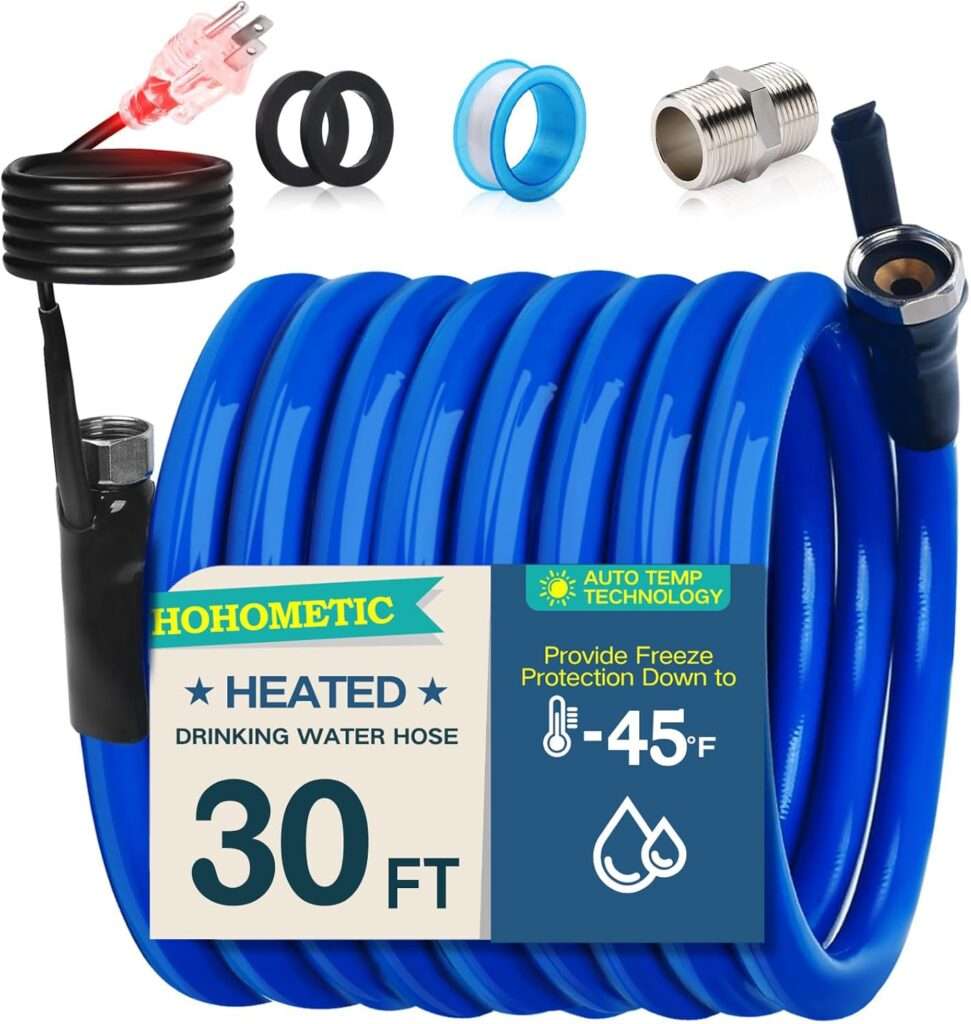
Key Specifications:
- Length: 30 feet
- Freeze Protection: Down to -45°F
- Material: BPA-free, food-grade drinking water-safe
- Heating System: Self-regulating thermostat
- Leak Protection: Compression-sealed joints prevent leaks
If you want a heated water hose that won’t break the bank, HOHOMETIC’s 30FT option is a solid pick. Despite its lower price, it doesn’t cut corners where it matters—drinking water safety, leak prevention, and freeze protection.
This hose can handle temperatures as low as -45°F, so it’s more than enough for most RVers. It has a simple plug-and-play design, making it easy to set up without extra tools. Plus, the compression-sealed fittings help prevent annoying leaks.
However, the lower price comes with trade-offs—it’s not as heavy-duty as premium options, and some users report that the outer insulation can wear out faster with rough use.
Pros:
- Budget-friendly price without sacrificing performance
- Freeze protection down to -45°F
- BPA-free and safe for drinking water
- Simple, easy-to-install design
- Leak-proof compression-sealed joints
Cons:
- Not as durable as higher-end hoses
- Outer insulation may wear down over time
- No advanced safety features like GFCI protection
4. Mid-Range Option: Nottia 50FT Heated Water Hose for RV

Key Specifications:
- Length: 50 feet
- Freeze Protection: Down to -45°F
- Material: Lead-free, BPA-free, and drinking water-safe
- Heating System: Smart self-regulating thermostat
- Durability: Reinforced exterior for extra protection
If you want a balance between price and performance, the Nottia 50FT Heated Water Hose is a great pick. It offers strong freeze protection (-45°F) while still being reasonably priced. The smart thermostat adjusts heating based on the temperature, so it doesn’t waste energy.
The hose is drinking water safe, meaning no weird plastic taste when you fill up your RV. Plus, the reinforced outer shell helps protect against wear and tear, making it a solid choice for frequent travelers.
On the downside, it’s not as widely known as brands like Camco, so long-term durability reports are limited. But for the price, it’s a reliable choice.
Pros:
- Strong freeze protection down to -45°F
- Self-regulating heating system for efficiency
- Drinking water safe with no plastic taste
- Tough outer shell for added durability
- Mid-range price with solid performance
Cons:
- Less brand recognition than Camco or Giraffe Tools
- Heavier than some other 50FT hoses
- No GFCI protection for added safety
5. Budget Friendly Option: Giraffe Tools 15FT Heated Water Hose for RV

Key Specifications:
- Length: 15 feet
- Freeze Protection: Down to -20°F
- Material: BPA-free, lead-free, and drinking water-safe
- Heating System: Self-adjusting heating cable
- Best For: Small RVs, campers, and tight storage spaces
Not everyone needs a huge hose. If you travel in a smaller van or just need a short connection, the Giraffe Tools 15FT Heated Water Hose is a perfect fit. It’s compact, easy to store, and keeps water flowing even in freezing temps.
This hose is made for drinking water, so there’s no chemical taste. The self-adjusting heating cable makes sure it doesn’t overheat, which is great for energy efficiency. It’s also one of the lightest options on this list, making it easy to handle.
The trade-off? It’s only rated for -20°F, which is fine for mild winters but may struggle in extreme cold.
Pros:
- Compact and lightweight—perfect for small setups
- Drinking water-safe with no plastic aftertaste
- Self-adjusting heat prevents overheating
- Easy to store when not in use
- Trusted brand with good reviews
Cons:
- Freeze protection isn’t as strong as others (-20°F)
- Not ideal for long-distance connections
- Less durable in extreme winter conditions
6. Versatile Use Option: Rylpoint 25FT Heated Water Hose for RV

Key Specifications:
- Length: 25 feet
- Freeze Protection: Down to -45°F
- Material: Lead-free, phthalate-free, and drinking water-safe
- Heating System: Self-regulating thermostat
- Best For: RVs, gardens, chicken coops, and home use
Some hoses are only good for RVs, but the Rylpoint 25FT Heated Water Hose is multi-purpose. You can use it for your RV, a garden, or even a chicken coop in winter. It’s rated for -45°F, making it strong enough for harsh weather.
The self-regulating thermostat prevents overheating while saving energy, and the five-layer construction adds durability. If you need a hose that can do it all, this is a great option.
However, the outer material isn’t as thick as premium hoses, so it might need extra care to prevent damage.
Pros:
- Versatile for RVs, gardens, and livestock
- Solid freeze protection down to -45°F
- Safe for drinking water with no chemical taste
- Self-regulating thermostat for efficiency
- Reinforced multi-layer construction
Cons:
- Not as heavy-duty as some premium brands
- Outer layer could be more durable
- No GFCI plug for extra safety
7. Smart Temperature Control: RVGUARD 25FT Heated Water Hose for RV

Key Specifications:
- Length: 25 feet
- Freeze Protection: Down to -20°F
- Material: Lead-free, BPA-free, drinking water-safe
- Heating System: Thermostat-controlled auto on/off
- Leak Protection: Stainless steel connectors
If you want a hose that does the thinking for you, the RVGUARD 25FT Heated Water Hose is a great pick. It features automatic temperature control, meaning it turns on and off depending on how cold it gets.
It’s drinking water safe, lead-free, and built with stainless steel fittings that prevent leaks. Plus, the heavy-duty exterior adds extra durability.
The only downside? It’s only rated for -20°F, so it’s not the best for extreme cold-weather campers.
Pros:
- Smart thermostat adjusts heating automatically
- Safe for drinking water (no lead, BPA, or phthalates)
- Stainless steel fittings for leak prevention
- Durable and well-insulated
- Energy-efficient design
Cons:
- Not the best for extreme cold (-20°F rating)
- Pricier than some budget options
- No GFCI protection
8. Extra Safety Features: GESUNDTEK 25FT Heated Water Hose for RV

Key Specifications:
- Length: 25 feet
- Freeze Protection: Down to -45°F
- Material: Lead-free, BPA-free, CA65 compliant
- Heating System: Self-regulating heating cable
- Safety: Built-in GFCI protection
For those who prioritize safety, the GESUNDTEK 25FT Heated Water Hose comes with built-in GFCI protection, which helps prevent electrical hazards—a great feature for peace of mind.
The hose is drinking water safe and handles temperatures as low as -45°F. It’s a great pick for anyone camping in extreme cold while wanting extra electrical safety.
However, it’s not as well-known as brands like Camco, so long-term reliability isn’t as tested.
Pros:
- GFCI protection prevents electrical hazards
- Freeze protection down to -45°F
- Drinking water-safe and CA65 compliant
- Self-regulating heat cable for efficiency
- Durable and leak-proof
Cons:
- Less brand recognition compared to bigger names
- Slightly more expensive due to safety features
- Can be bulky for smaller RV setups
9. Multi-Length Option: Bipeoo 75FT Heated Water Hose for RV
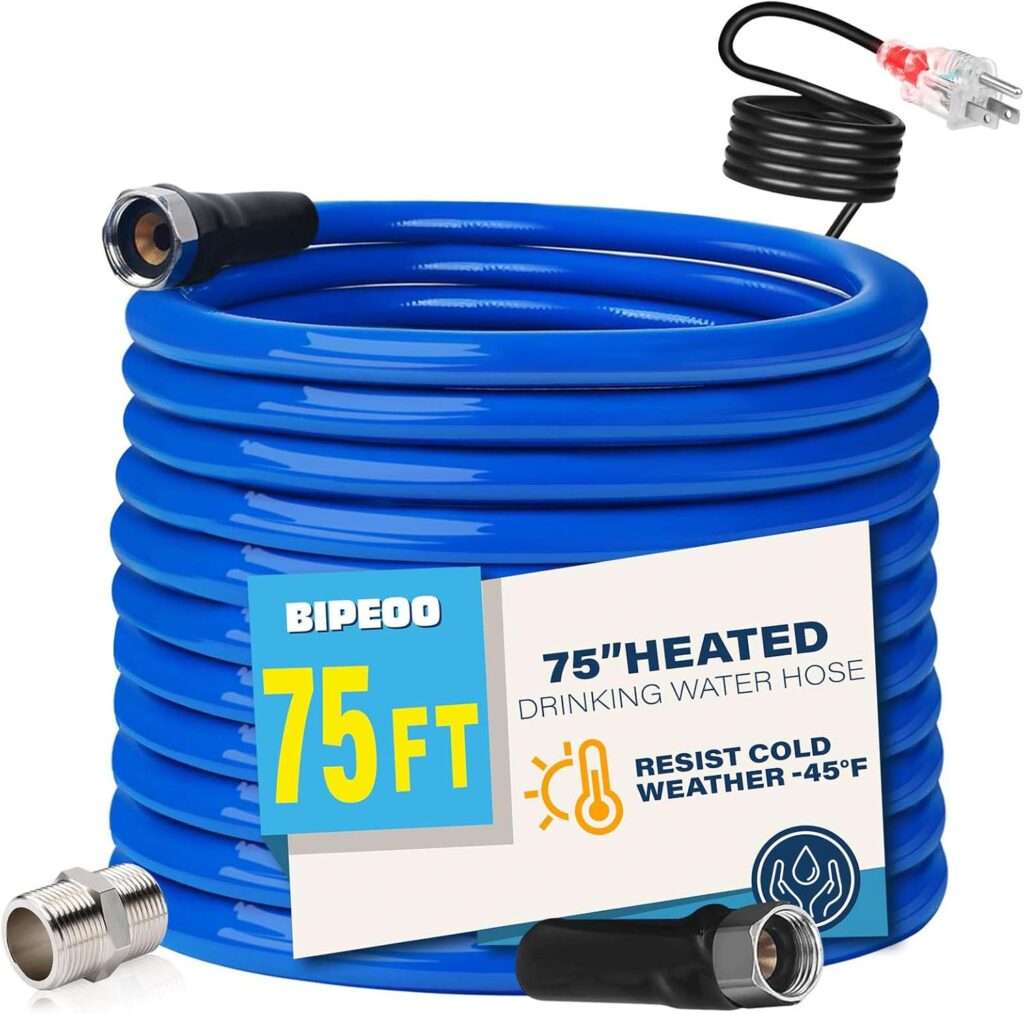
Key Specifications:
- Length: Available in 15FT, 30FT, 50FT, and 100FT
- Freeze Protection: Down to -45°F
- Material: Lead-free and BPA-free
- Heating System: Smart thermostat for automatic heating
- Durability: Heavy-duty outer jacket
If you need flexibility, the Bipeoo Heated Water Hose is available in multiple lengths, making it easy to find the right fit for your setup. It also features smart temperature control, meaning it adjusts heat output automatically.
It’s a solid all-rounder, but storage can be a challenge with longer versions.
Pros:
- Available in multiple sizes
- Self-adjusting heating system saves energy
- Tough exterior for extra durability
- Drinking water-safe materials
- Good value for money
Cons:
- Longer versions take up a lot of storage space
- Heavy compared to standard hoses
- Not as widely tested as other brands
What is a Heated RV Water Hose?
A heated RV water hose is a specially designed hose that prevents water from freezing in cold weather by using built-in heating elements. It ensures a continuous water supply even in subzero temperatures, making it a must-have for winter RVers.
These hoses come with self-regulating or thermostat-controlled heating cables wrapped around the inner tubing. Some models activate automatically when temperatures drop, while others maintain a constant heat level. They are typically made from drinking water-safe materials, so you don’t have to worry about contamination.
Whether you’re living in your RV full-time or just camping in the winter, a heated hose is a simple way to avoid the hassle of frozen pipes and damaged water lines.
How Does a Heated Water Hose Work?
A heated water hose works by using an electric heating cable embedded within the hose walls. This cable generates heat to keep the water inside from freezing, even when outside temperatures drop well below freezing.
Some hoses use a self-regulating heating system, which adjusts the heat output based on temperature changes, preventing overheating and saving energy. Others have thermostat-controlled heating, turning on and off automatically to maintain a safe water flow.
Most heated hoses are plug-and-play, meaning you simply connect them to a power source (usually a standard 120V outlet), attach them to your water supply, and let the built-in heating elements do their job.
How to Choose the Best Heated RV Water Hose?
Picking the right heated hose depends on where you’re camping and how cold it gets. Here’s what you need to consider:
1. Length – Getting the Right Fit
A hose that’s too short won’t reach your water hookup, and one that’s too long can be bulky to store. Common lengths range from 15 to 100 feet, so measure the distance between your RV’s water inlet and the spigot before buying.
If you frequently change campsites, a 50-foot hose is a versatile choice. For long-term stays with fixed hookups, matching the exact distance is better to avoid excess hose lying around.
2. Freeze Protection – How Cold Will It Get?
Some hoses protect down to -20°F, while others handle -45°F or lower. If you’re winter camping in mild climates, a standard heated hose will do the trick. But if you’re heading to Alaska or the northern Rockies, invest in one with the lowest temperature rating possible.
Look for self-regulating heating cables if you expect drastic temperature drops—they adjust the heat output automatically, so you won’t waste power.
3. Drinking Water Safety – No Weird Tastes or Chemicals
Since you’ll likely use this hose for drinking, cooking, and showering, make sure it’s lead-free, BPA-free, and NSF-certified for drinking water safety. Cheaper hoses sometimes leave a plastic aftertaste, so stick with trusted brands that use high-quality materials.
4. Energy Efficiency – Save on Power
A thermostat-controlled hose only heats when needed, reducing electricity use. Self-regulating hoses are even smarter—they adjust their heating levels based on real-time temperatures, keeping your water from freezing while avoiding excessive energy consumption.
If you rely on solar power or have limited hookups, go for a hose that prioritizes efficiency.
5. Durability & Leak Prevention
Hoses with reinforced outer jackets protect against abrasions, snow, and ice buildup. Brass or stainless steel fittings are more resistant to corrosion than plastic ones, preventing leaks over time.
If you’re rough on your gear or travel frequently, investing in a heavy-duty model will save you headaches in the long run.
Alternative Ways to Keep Your RV Water Hose from Freezing
If you don’t have a heated hose or need extra protection, here are a few alternative methods:
- Insulated Hose Wraps: Foam pipe insulation or heated tape can be wrapped around a regular water hose for added warmth.
- Keep Water Flowing: A slow drip prevents freezing by keeping water moving, though this can waste water in dry camping situations.
- Heat Tracing Tape: Wrapping a heat cable around your existing hose and covering it with insulation can provide DIY freeze protection.
- Store Hose Indoors When Not in Use: If you only need water at certain times, bring the hose inside when temperatures drop.
- Use a Heated Water Source: Some RV parks offer heated water connections, reducing the need for a heated hose altogether.
Wrapping It Up!
Choosing the best heated RV water hose depends on where you travel, how cold it gets, and how much storage space you have. Some hoses focus on extreme cold protection, while others prioritize energy efficiency or budget-friendly pricing.
If you’re looking for an all-around solid choice, the Camco 50FT Heated Water Hose is a great pick. It’s built to last, safe for drinking water, and comes with a thermostat-controlled heating system to prevent freezing.
For those camping in extreme cold conditions, the REHOSEUP 100FT Heated Water Hose is the better option. It offers freeze protection down to -45°F and features a self-regulating heating system, making it ideal for northern states or full-time winter RVers.
If you’re on a budget but still want reliable performance, go for the HOHOMETIC 30FT Heated Water Hose. It’s affordable, provides freeze protection down to -45°F, and is drinking water-safe, making it a great value-for-money option.
No matter which one you choose, investing in a heated RV water hose means you won’t have to deal with frozen water lines or broken hoses. Stay warm, stay hydrated, and enjoy the road—even in the coldest months!
Related FAQs
1. Do heated RV water hoses use a lot of electricity?
No, most heated hoses are energy-efficient. Self-regulating hoses only heat when needed, and thermostat-controlled ones turn on and off automatically, saving power.
2. Can I leave my heated water hose plugged in all the time?
Yes, you can. Heated hoses are designed to stay plugged in and work only when needed. Just make sure the connections stay dry and secure.
3. What happens if my heated hose stops working in freezing weather?
If your hose isn’t heating, check the power source, plug connections, and thermostat (if it has one). If it still doesn’t work, use insulation or store the hose inside when not in use.
4. Do I still need to insulate my heated RV hose?
Not always. Most heated hoses are built with insulation. However, if you’re in extreme cold (below -30°F), adding extra insulation can help.
5. Can I use a heated RV water hose for drinking water?
Yes, as long as it’s labeled BPA-free, lead-free, and NSF-certified for drinking water. Always check the manufacturer’s details before buying.
6. How long do heated RV water hoses last?
A good-quality heated hose can last 3-5 years or more with proper care. Store it properly and avoid bending or twisting it to extend its life.
As outdoor enthusiasts ourselves, we understand the significance of reliable gear that can withstand the elements and support you throughout your journey. We try to provide as much real life information with our guides and how tos to the readers as possible. Our honest and transparent reviews of essential outdoor gadgets and products are rooted in testing and experience. We take great satisfaction in offering unbiased evaluations, ensuring that you can make informed decisions when investing in outdoor gear. As an affiliate website, we may earn a small commission from some of the products we feature. However, rest assured that our opinions are not influenced by this, and your trust is always our top priority.
